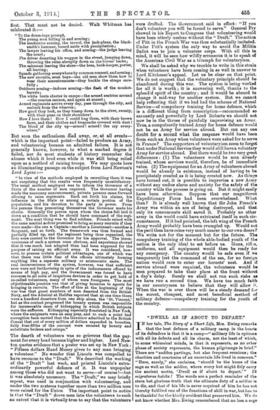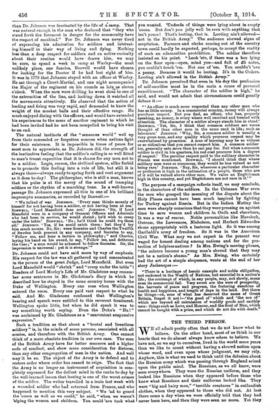" DWELL AS IF ABOUT TO DEPART."
IN her tale, The Story of a Short Life, Mrs. Ewing remarks that the best defence of a military camp in the hearts of its defenders is that it is a camp—" military life in epitome with all its defects and all its charm, not the least of which, to some whimsical minds, is that it represents, as no other phase of society represents, the human pilgrimage in brief." There are " sudden partings, but also frequent reunions; the charities and courtesies of an uncertain life lived in common." "Here, surely," she exclaims, "should be the home of the sage as well as the soldier, where every but might fitly carry the ancient motto, 'Dwell as if about to depart.' " lit rnigraturu.s habita ! The words are a perfect reminder of the stern but glorious truth that the ultimate duty of a soldier is to die, and that if his life is never required of him he has not thereby fulfilled one of the functions of skill in war, but has to be thankful for the kindly accident that preserved him. We do not know whether Mrs. Ewing remembered that no leas a sage
than Dr. Johnson was fascinated by the life of a camp. That was natural enough in the man who declared that "they who stand forth the foremost in danger for the community have the respect of mankind." For Dr. Johnson was never tired of expressing his admiration for soldiers and intelest- ing himself in their way of living and dying. Nothing less than a deep respect for soldiers and an active curiosity about their routine would have drawn him, we may be sure, to spend a week in camp at Warley—the most unlikely place, one fancies, Boswell would have chosen for looking for the Doctor if he bad lost sight of him. It was in 1778 that Johnson stayed with an officer at Wesley.
He sat through a Court-Martial, and one night accompanied the Major of the regiment on his rounds as late as eleven o'clock. When the men were drilling he went close to one of the extremities of the line, and looking down it watched all the movements attentively. He observed that the action of loading and firing was very rapid, and demanded to know the weight of the musket balls and their effective range. He much enjoyed dining with the officers, and would have extended his experiences to the mess of another regiment to which he had been invited had he not been compelled to bring his visit to an end.
The natural instincts of the " sensuous world " well up from their concealed or forgotten sources when nations fight for their existence. It is impossible in times of peace for most men to appreciate, as Dr. Johnson did, the strength of the instinctive feeling that the soldier's calling is so well fitted to man's truest capacities that it is shame for any man not to be a soldier. Logic, reason, the civilized eystem, alike forbid us to promote this feeling into a rule of life, but still it is always there—always ready to spring forth and rout argument as it does to-day ! The philosopher, who is still a man, knows that his pulse is at the mercy of the sound of tramping soldiers or the rhythm of a marching tune. In a well-known passage Dr. Johnson expressed all this in one of his brilliant impromptu summaries, as recorded by Boswell:-
" We talked of war. JOHNSON. 'Every man thinks meanly of himself for not having been a soldier, or not having been at sea.' Boswstt. ' Lord Mansfield does not.' JOHNSON. ' Sir, if Lord Mansfield were in a company of General Officers and Admirals who had been in service, he would shrink ; he'd wish to creep under the table.' Boswxan. No ; he'd think he could try them alL' JOHNSON. Yes, if he Gould catch them : but they'd try him much sooner. No, Sir : were Socrates and Charles the Twelfth of Sweden both present in any company, and Socrates to say, " Follow me, and hear a lecture in philosophy ; " and Charles, laying his hand on his sword, to say, "Follow me, and dethrone the Czar ; " a man would be ashamed to follow Socrates. Sir, the impression is universal : yet it is strange.'" Dr. Johnson could not have said more by way of emphasis. His respect for the law was all gathered up and concentrated in the person of the great Judge, Lord Mansfield. But even
Lord Mansfield would " shrink " and "creep under the table"! Readers of Lord Morley's Life of Mr. Gladstone may remem- ber some sentences in Mr. Gladstone's diary in which he described how he stayed in the same country house with the Duke of Wellington. Every one rose when Wellington entered the room. Every one paid vast respect to what he Bald. And Mr. Gladstone confessed that Wellington's bearing and speech were entitled to this reverent treatment. Wellington spoke little, but when he did speak it was to say something worth saying. Even the Duke's "Ha!" was acclaimed by Mr. Gladstone as a " convenient suspensive expression."
Such a tradition as that about a " brutal and licentious soldiery" is, in the minds of some persons, associated with all armies, and therefore with the British Army. One cannot think of a more obsolete tradition in our own case. The men of the British Army have far better manners and a higher code of conduct, and show more consideration for distress, than any other congregation of men in the nation. And well may it be so. The object of the Army is to defend and to restore order where order has ceased to reign. The fact that the Army is no longer an instrument of acquisition is com- pletely expressed for the dullest mind in the ranks to-day by the well-learned lesson that looting is one of the worst crimes of the soldier. The writer travelled in a train last week with a wounded soldier who bad returned from France, and who happened to mention this very subject. " We 'ad to guard the 'oases as well as we could," he said, " when we weren't 'elping the women and children. You could 'ave took what
you wanted. '17ndreds of things were lying about in empty 'ouses. But don't you jolly well be seen with anything that
isn't yours ! That's looting, that is. Looting ain't allowed— not in the British Army." The audience showed signs of scepticism. Farmers and clerks coming out of the country town could hardly be expected, perhaps, to accept the reality
of such an adamantine prohibition. The soldier therefore insisted on his point. "Look 'ere, if there was a box lying on the floor open—open, mind you—and full of 25 notes, you couldn't touch 'em. Not one of 'em. You couldn't 'ave a penny. Because it would be looting. It's in the Orders. Looting ain't allowed in the British Army."
Dr. Johnson perceived that even in his day the profession of self-sacrifice must be in the main a cause of personal ennoblement. "The character of the soldier is high," lie said, and would not admit that circumstances could greatly debase it :— " An officer is much more respected than any other man who has as little money. In a commercial country, money will always purchase respect. But you find, an officer, who has, properly speaking, no money, is every where well received and treated with attention. The character of a soldier always stands him in stead.' Boswitta.. 'Yet, Sir, I think that common soldiers are worse thought of than other men in the same rank in life ; such as labourers.' Joigsoi.r. Why, Sir, a common soldier is usually a very gross man, and any quality which procures respect may be overwhelmed by grossness. A man of learning may be so vicious or so ridiculous that you cannot respect him. A common soldier too, generally eats more than he can pay for. Bat when a common soldier is civil in his quarters, his red coat procures him a degree of respect.' The peculiar respect paid to the military character in France was mentioned. Boswxnn. 'I should think that where military men were so numerous, they would be less valued as not being rare.' JOHNSON. ' Nay, Sir, wherever a particular character or profession is high in the estimation of a people, those who are of it will be valued above other men. We value an Englishman high in this country, and yet Englishmen are not rare in it "
The purpose of a campaign reflects itself, we may conclude, in the characters of the soldiers. In the Crimean War even the men who grasped the meaning of the dispute about the Holy Places cannot have been much inspired by fighting for Turkey against Russia. But in the Indian Mutiny the men were sharply conscious that they were pressing on against
time to save women and children in Oudh and elsewhere, It was a war of rescue. Noble personalities like Havelock, Outram, the Lawrences, Nicholson, and Herbert Edwardes shone appropriately with a lustrous light. So it was among Garibaldi's army of freedom. So it was in the American Civil War. What may we not expect in the present war waged for honest dealing among nations and for the pro- tection of helpless nations P In Mrs. Ewing's moving phrase, "the colours become a young man's shroud that they may not be a nation's shame." As Mrs. Ewing, who certainly had the art of a simple eloquence, wrote at the end of her story jackanapes :— "There is a heritage of heroic example and noble obligation, not reckoned in the Wealth of Nations, but essential to a nation's life ; the contempt of which, in any people, may, not slowly, mean even its commercial fall. Very sweet are the uses of prosperity, the harvests of peace and progress, the fostering sunshine of health and happiness, and length of days in the land. But there be things—oh, sons of what has deserved the name of Great Britain, forget it not the good of ' which and 'the use of which are beyond all calculation of worldly goods and earthly uses : things such as Love, and Honour, and the Soul of Man, which cannot be bought with a price, and which do not die with death."











































 Previous page
Previous page